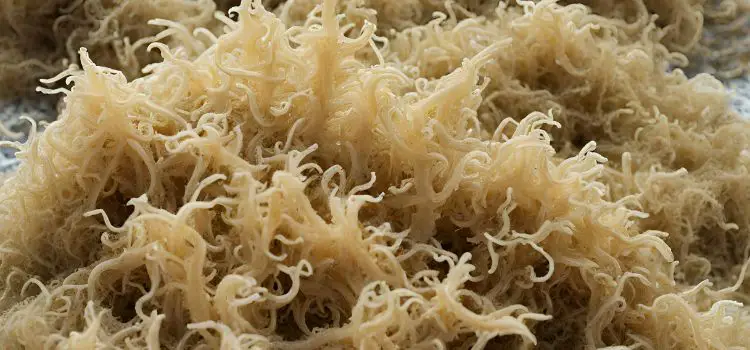Yes, Sea Moss is safe to consume during pregnancy. Sea Moss is a nutrient-rich seaweed that offers numerous benefits for pregnant women and their developing babies.

During my pregnancy, I became curious about sea moss and its safety. Like many expecting mothers, I wanted to ensure everything I consumed was safe for both me and my baby.
In this article, I’ll explore the safety of sea moss during pregnancy, providing insights and considerations to help you make informed choices for a healthy pregnancy journey.
Understanding The Benefits Of Sea Moss During Pregnancy
Sea moss is considered safe during pregnancy and has numerous benefits. Rich in nutrients and minerals, it supports the immune system, aids digestion, and provides vital nutrients for both the mother and the developing baby.
Incorporating sea moss into a balanced diet can be a healthy choice for expectant mothers.
A Brief Introduction Of Sea Moss
Sea moss, also known as Irish moss, is a type of seaweed that has been consumed for centuries due to its numerous health benefits. This nutrient-packed seaweed is gaining popularity among pregnant women, who are looking for natural ways to support their overall well-being during pregnancy.
In this section, we will delve into the benefits of sea moss specifically for expecting mothers and their unborn babies.
Key Nutrients In Sea Moss For Pregnant Women
Sea moss is a rich source of essential nutrients that are particularly beneficial for pregnant women. Here are some key nutrients found in sea moss:
- Iodine: Sea moss is an excellent natural source of iodine, an essential mineral that plays a vital role in the development of the baby’s brain and nervous system.
- Iron: Iron is crucial for the production of red blood cells and oxygen transportation, both of which are especially important during pregnancy. Sea moss contains iron, making it a valuable addition to a pregnant woman’s diet.
- Vitamins: Sea moss is packed with vitamins like vitamin A, vitamin C, and vitamin E, which are vital for maintaining a healthy immune system and promoting proper growth and development of the baby.
- Omega-3 fatty acids: Sea moss is a plant-based source of omega-3 fatty acids, which are known for their anti-inflammatory properties. These fatty acids are essential for the baby’s brain and eye development and can also help reduce the risk of preterm birth.
How Sea Moss Supports Optimal Fetal Development
Sea moss offers several benefits that support optimal fetal development during pregnancy. Here’s how sea moss can contribute to a healthy pregnancy:
- Promotes healthy weight gain: Sea moss is low in calories while being rich in essential nutrients, making it a great addition to a healthy pregnancy diet. It can help support healthy weight gain for both the mother and baby.
- Boosts immune system: The vitamins and minerals in sea moss can enhance the immune system, helping to protect both the mother and baby from infections and illnesses.
- Improves digestion: Sea moss is a great source of fiber, which can aid in relieving common digestive issues during pregnancy, such as constipation.
- Enhances energy levels: The iron content in sea moss helps prevent iron deficiency anemia, a common condition among pregnant women that can cause fatigue and low energy levels. By boosting iron levels, sea moss can help expectant mothers feel more energized.
- Supports overall health: Sea moss is believed to have anti-inflammatory properties and may help regulate blood pressure levels, which is crucial for a healthy pregnancy.
Including sea moss in a balanced and varied diet can provide pregnant women with essential nutrients, support optimal fetal development, and contribute to overall well-being during this special time.
However, it’s important to consult with a healthcare professional before adding sea moss or any other new food to your pregnancy diet to ensure it aligns with your specific needs and requirements.
Safety Considerations And Precautions Of Sea Moss

Sea moss is generally considered safe during pregnancy, but it is crucial for pregnant women to consult with their healthcare provider before adding it to their diet. It is important to follow safety considerations and take necessary precautions to ensure a healthy and safe pregnancy.
Is Sea Moss Safe For Pregnant Women?
Sea moss, also known as Irish moss or carrageenan, has gained popularity for its potential health benefits. However, if you’re pregnant, you might be wondering whether it’s safe to consume sea moss during this crucial time.
In this section, we will discuss the safety considerations and precautions associated with sea moss consumption during pregnancy.
When it comes to sea moss consumption during pregnancy, it’s important to be aware of potential risks and side effects as well as recommended dosage and usage guidelines. Let’s delve into each of these aspects.
Potential Risks And Side Effects Of Sea Moss During Pregnancy
- Contamination: Sea moss sourced from polluted waters may contain harmful substances such as heavy metals, toxins, or bacteria. It’s crucial to ensure you obtain sea moss from reputable sources that adhere to stringent quality control measures.
- Allergic Reactions: Some individuals may have an allergic reaction to sea moss. If you’ve never consumed it before, it’s advisable to consult with your healthcare provider before incorporating it into your diet.
- Hormonal Effects: Sea moss contains iodine, which plays a vital role in thyroid hormone production. However, excessive iodine intake may have adverse effects on the thyroid gland. If you have any thyroid-related conditions or concerns, it’s essential to consult with your healthcare provider before consuming sea moss.
Recommended Dosage And Usage Guidelines
- Consult with Your Healthcare Provider: Before adding sea moss to your diet during pregnancy, it’s crucial to consult with your healthcare provider. They can provide personalized advice based on your specific health needs and circumstances.
- Moderation: It’s advisable to consume sea moss in moderation during pregnancy to mitigate any potential risks. Follow the recommended dosage guidelines provided by your healthcare provider, if they deem it safe for you to consume.
- Variety and Balance: It’s important to emphasize a well-rounded diet during pregnancy, including a variety of nutrient-rich foods. Sea moss can be incorporated as part of a balanced diet, but it shouldn’t be relied upon as a sole source of essential nutrients.
Remember, every pregnancy is unique, and what works for one person may not work for another. Prioritize open communication with your healthcare provider to ensure you make informed decisions regarding sea moss consumption during pregnancy.
Addressing Common Concerns And Misconceptions About Sea Moss

Sea moss is safe to consume during pregnancy, and it can provide various health benefits. Rich in nutrients and minerals, sea moss can support a healthy pregnancy and contribute to overall well-being. However, it is essential to consult with a healthcare professional before adding it to your diet.
What You Need To Know About Sea Moss And Gestational Diabetes
Sea Moss has gained popularity as a potential remedy for gestational diabetes during pregnancy. Here’s what you should know about Sea Moss and its effects on gestational diabetes:
- Sea Moss contains a high concentration of iodine, which is essential for thyroid function. A healthy thyroid is important during pregnancy to regulate metabolism and support the development of the baby.
- The iodine in Sea Moss may help to stabilize blood sugar levels, which is beneficial for women with gestational diabetes. However, it is important to note that Sea Moss alone cannot replace medical treatment or a proper gestational diabetes management plan.
- If you have gestational diabetes, consult with your healthcare provider before incorporating Sea Moss into your diet. They will be able to provide personalized advice and guide you on how much Sea Moss is safe to consume.
Sea Moss And Allergic Reactions During Pregnancy
Allergic reactions during pregnancy can be a cause for concern. Here’s what you should know about the potential risks of Sea Moss allergies during pregnancy:
- Sea Moss is a natural product, but like any other food, it can cause allergic reactions in some individuals. Common symptoms of an allergic reaction to Sea Moss may include rashes, itching, swelling, and difficulty breathing.
- If you are allergic to seafood, particularly shellfish, you may also be allergic to Sea Moss, as it shares similar proteins. It’s crucial to be aware of your allergies and consult with your healthcare provider before incorporating Sea Moss into your diet.
- If you experience any allergic symptoms after consuming Sea Moss, cease its use immediately and seek medical attention. Your healthcare provider can determine if the symptoms are related to Sea Moss and advise on appropriate next steps.
Sea Moss Vs. Other Pregnancy Supplements
When it comes to pregnancy supplements, Sea Moss offers unique benefits. Here’s a comparison between Sea Moss and other commonly used pregnancy supplements:
- Sea Moss is a natural source of essential vitamins and minerals. It contains vital nutrients such as iodine, iron, calcium, and folate, which are important for the healthy development of the baby.
- Unlike some prenatal supplements, Sea Moss is free from artificial additives and fillers. It is a whole-food source of nutrients, making it an attractive choice for those seeking natural alternatives.
- However, it’s important to note that Sea Moss is not a replacement for a well-balanced diet and prenatal supplements recommended by your healthcare provider. It can be incorporated into your diet as a complementary nutritional boost.
- Before adding any supplement to your pregnancy routine, consult with your healthcare provider to ensure it is safe and appropriate for your individual needs.
Incorporating Sea Moss Into Your Pregnancy Diet

Sea moss is a safe and nutritious addition to your pregnancy diet, providing essential vitamins and minerals for you and your baby’s health. Incorporating sea moss can help support a healthy immune system, aid in digestion, and promote overall well-being during pregnancy.
If you’re considering incorporating sea moss into your pregnancy diet, here are some tips to help you make the most of this seaweed’s benefits:
Preparing And Cooking Sea Moss For Consumption
When it comes to consuming sea moss, the preparation process is crucial to ensure its safety and maximize its nutritional value. Here are some steps to follow when preparing and cooking sea moss:
- Start by thoroughly rinsing the dried sea moss to remove any debris or salt residue.
- Soak the sea moss in water for at least 24-48 hours until it becomes soft and expands in size.
- Rinse the sea moss again to ensure all impurities are removed.
- Blend the soaked sea moss with water to create a gel-like consistency that can be easily incorporated into your recipes.
- Store the prepared sea moss gel in an airtight container in the refrigerator for future use.
Delicious Sea Moss Recipes For Pregnant Women
Incorporating sea moss into your pregnancy diet doesn’t have to be boring. Here are some tasty recipe ideas that can help you enjoy the benefits of sea moss:
- Sea Moss Smoothie: Blend sea moss gel with your favorite fruits, such as bananas, berries, or mangoes, along with almond milk or coconut water for a refreshing and nutrient-packed smoothie.
- Sea Moss Pudding: Mix sea moss gel with a plant-based milk of your choice, vanilla extract, and a natural sweetener like agave or maple syrup. Refrigerate until it sets into a delicious pudding-like consistency.
- Sea Moss Salad Dressing: Combine sea moss gel with lemon juice, olive oil, minced garlic, and herbs like parsley or dill to create a healthy and flavorful salad dressing.
Combining Sea Moss With Other Nutrient-Rich Foods
To further enhance the nutritional benefits of sea moss, consider combining it with other nutrient-rich foods in your pregnancy diet. Here are some ideas:
- Chia Seeds: Add chia seeds to your sea moss smoothies for an extra boost of omega-3 fatty acids and fiber.
- Leafy Greens: Incorporate sea moss into your leafy green salads, providing you with a dose of vitamins, minerals, and antioxidants.
- Nuts and Seeds: Sprinkle crushed nuts or seeds like almonds, flaxseeds, or pumpkin seeds on top of your sea moss pudding for added crunch and nutritional value.
Expert Opinions And Research Findings
Sea moss has been a popular topic of discussion during pregnancy. Research findings suggest that sea moss is generally considered safe for consumption during pregnancy, but it is important to consult with a healthcare professional for personalized advice and guidance.
Sea moss, also known as Irish moss or Chondrus crispus, has gained popularity as a nutritional powerhouse due to its numerous health benefits. However, expecting mothers often question whether it is safe to consume sea moss during pregnancy.
In this section, we will explore expert opinions and research findings to shed light on the safety and efficacy of sea moss during pregnancy.
Scientific Studies On The Safety And Efficacy Of Sea Moss During Pregnancy
Limited scientific studies have specifically focused on the safety and efficacy of sea moss consumption during pregnancy. However, sea moss is generally considered safe for pregnant women when consumed in moderation.
The rich nutritional profile of sea moss, including vitamins, minerals, and antioxidants, can provide essential support during pregnancy. The presence of iodine in sea moss is beneficial for fetal brain development.
Some studies have also suggested that sea moss may help alleviate common pregnancy symptoms, such as iron-deficiency anemia and constipation.
Insights From Health Professionals On Sea Moss Consumption For Pregnant Women
Health professionals generally recommend consulting with a healthcare provider before incorporating sea moss into the diet during pregnancy. They emphasize the importance of sourcing sea moss from reputable suppliers to ensure quality and minimize the risk of contamination.
Moderation is key, as excessive consumption of sea moss may lead to unwanted effects. Pregnant women with preexisting medical conditions, such as thyroid disorders or bleeding disorders, are advised to exercise caution and consult with their healthcare provider.
Health professionals also stress the significance of a balanced and varied diet during pregnancy, incorporating a range of nutrient-rich foods.
Testimonials And Experiences Of Pregnant Women Using Sea Moss
Many pregnant women have reported positive experiences with sea moss consumption during their pregnancy. Testimonials suggest that including sea moss in their diet has provided them with increased energy levels and aided in maintaining a healthy weight.
Some women have found relief from common pregnancy symptoms, such as morning sickness and digestive issues, after incorporating sea moss into their routine. However, it’s important to remember that individual experiences may vary, and it is advisable to seek medical advice before making any dietary changes during pregnancy.
While scientific studies on the safety and efficacy of sea moss during pregnancy are limited, it is generally considered safe for pregnant women when consumed in moderation. With its nutritional benefits, sea moss may be a valuable addition to a healthy and balanced pregnancy diet.
Frequently Asked Questions Of Is Sea Moss Safe During Pregnancy
Is It Good To Drink Sea Moss While Pregnant?
Sea moss can be beneficial during pregnancy, but consult your doctor for personalized advice.
What Does Sea Moss Do For Fetus?
Sea moss is beneficial for the fetus as it provides essential nutrients for healthy development.
Who Should Avoid Seamoss?
Seamoss should be avoided by individuals who have allergies to seaweed or iodine.
Is Sea Moss High In Mercury?
No, sea moss is not high in mercury.
Conclusion
Sea moss can be a safe and beneficial addition to a pregnant woman’s diet. Its rich nutritional profile offers essential vitamins and minerals that support both mother and baby during this crucial time.
From boosting the immune system to promoting healthy digestion, sea moss can address common pregnancy discomforts. However, it is crucial to consult with a healthcare professional before incorporating sea moss into your pregnancy diet.
They can provide personalized guidance based on your specific health needs and any potential risks. Remember to source high-quality sea moss and consume it in moderation. As with any natural supplement or food, it is important to listen to your body and monitor any reactions or changes throughout your pregnancy journey.
Ultimately, prioritizing your and your baby’s well-being is key, and sea moss can be a safe and beneficial addition to a balanced and nutritious pregnancy diet.
Leave a Reply